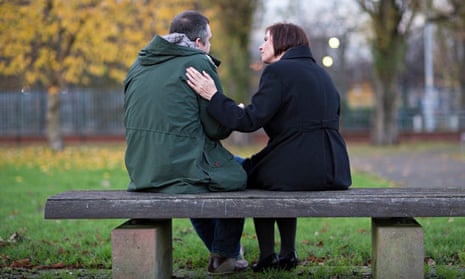Who do you talk to you when your 10-year-old son tells you, racked with fear, that cameras have been installed in the school playground to spy on him? Or when, a couple of years later, he decides he is no longer able to drink anything because the water in the taps has been poisoned? How do you respond when he tells you he is worried that people are injecting toxins into the veins of his hands at night?
To begin with, Lindsey Cree tried explaining the situation to her GP, pointing out that there were no CCTV cameras and that her son’s fears seemed hard to understand. In a series of rushed consultations, she was reassured that things were probably fine. When her son turned 13, specialists told her his odd behaviour might be triggered by teenage hormones. Cree decided she must be an inept parent.
Meanwhile, her son had taken to sleeping in ditches and fields, convinced that the radiators in the family home were emitting poisonous gases that would kill him.
Shortly after her son turned 16, Cree called NHS Direct, desperate to find someone to help him. Police were dispatched to the home. They sectioned him and took him to hospital in handcuffs. Later he was diagnosed with schizophrenia by a doctor who told Cree in a brutally matter-of-fact way. The condition had never previously been mentioned to her.
In addition to the anxiety of getting help for her son, Cree was distressed about having no one to talk to who understood the crisis her family was experiencing. She contacted Rethink Mental Illness, one of the Guardian and Observer’s nine Christmas appeal charities – which focuses on people with schizophrenia, bipolar disorder and other severe mental illnesses – and joined a local support group for carers, where she met other parents and carers who had endured similar situations.
“You feel so isolated. I didn’t know anyone in my situation. The realisation that other people have been through this is really powerful,” she says. With the help of the charity and the support group, she learned how to sleep better, how to deal with her own anxiety and how to get better help for her son.
“For a while I felt worthless as a mother and I didn’t think this was something I could talk to my friends about. But when you go to a group, there is no stigma in the room. People can talk freely,” she says.
Cree now manages the Rethink Manchester Carers in Action group. It runs classes in things such as how to eat well to enhance your mood. Collectively, members offer each other advice on how to navigate the benefits systems to get vital financial support. Rethink also offers advice on different kinds of therapy and medication, what to do if the police or courts become involved, and on understanding a patient’s rights under the Mental Health Act. “There are so many things you can’t ask a hospital doctor or a GP because they simply haven’t got the time. It has been incredibly educational,” she says.
The knowledge that Cree gained has made her a campaigner for better care for her son, now 22. When, two years ago, he was put in a seclusion unit over Christmas (partly, she thinks, because of short-staffing at the hospital where he was being treated) and was prevented from receiving visits from his family, she argued that this was not acceptable and fought successfully for him to be transferred to a hospital, where he is now getting excellent care.
At the group’s monthly session in Manchester, Cree and fellow participants explain how, as council and NHS-funded mental health services are cut back drastically, this kind of peer support service is vital. It also saves the NHS money by intervening early to avert problems that might otherwise require expensive treatment. “The mental health community teams don’t have the time to talk and offer that human support. They would love to be able to, but they are really stretched. This really fills a gap,” Cree says.
A Rethink advocate who supports patients when they are admitted to hospital says he thinks the community groups are essential. “There is much less help available. [NHS] Staff are rushed off their feet – they are making sure patients don’t get out, that they don’t come to any harm, just watching over them – but they don’t have time to talk. Morale is low, staff are leaving and posts are being cut. Everyone is under pressure,” he says.
Craig Hamilton, a carer, who also has a history of mental health problems, says: “Talking here means that the volcano doesn’t erupt so violently. There might be a little eruption here or there, but it never gets like Vesuvius.” Another member says: “This group has helped me come back from the brink.”
There is a residual stigma about mental illness, although Cree has noticed things improving. “People are more curious than horrified because the stigma is diminishing,” she says. But she still encounters an uncomfortable pause when she says her son has schizophrenia. “There’s a blank look, and they say ‘Oh dear!’. If I said my son had cancer or had had a heart attack, the response would be very different.”
There are 120 support groups across the country, which are relatively cheap to run, but Rethink also needs money to fund its helpline and website, which give advice to 500,000 people every year. The charity directly supports around 60,000 people annually to get through crises and live independently. It also campaigns for improvements to services for the millions of people in the UK with mental health problems.
It helps people to feel more positive about the future. Says a group member: “There is a lot more hope now for recovery. These conditions are no longer seen as a life sentence.”





Comments (…)
Sign in or create your Guardian account to join the discussion